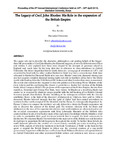| dc.description.abstract | This paper sets out to describe the character, philosophies and guiding beliefs of the biggerthan-life personality of Cecil John Rhodes, the diamond magnate, as seen by different researchers and writers. It also explains how these were shaped by his attempts at grammar school in England and much later by his long stint due to absences in class-attendance in Oxford University. His father dispatched him to South Africa at a young age of seventeen in 1871 and on arrival he lived with his elder brother Herbert in Natal who was a cotton farmer. Both later relocated to Kimberley Diamond Fields after one year. Rhodes’ entry into diamond mining that saw him acquire complete diamond mining rights not only in Southern Africa but in the whole world with funding from the N.M. Rothschild bankers and other London financiers, is examined. The article also examines the magnate’s entry into politics and becoming Prime Minister of the Cape Colony and his convincing the Queen to grant him a charter for creation of the British South Africa Company (BSAC). For purposes of the expansion of the British Empire, the two Boer republics, Transvaal and Orange Free State, were viewed by Rhodes as a stumbling block that needed to be removed by whatever means possible with the full backing of the British Colonial Secretary Joseph Chamberlain. Rhodes’ handling of the subsequent conflicts with the already established Boers in the light of the discovery of diamonds in 1866 and later gold in 1886 is discussed. Rhodes believed strongly that the ‘gold of Ophir’ had been mined somewhere in territory further north occupied by the Matabele and the Shona. He subsequently dispatched the Pioneer Column to conquer the territory not only driven by a desire for Empire expansion but also to discover the sources of the famed gold. His tenuous relations with the Boers and Afrikaners in the face of his expansionist schemes and confrontations are discussed and so are the so-called concessions agreements with King Lobengula Khumalo of the Ndebele who controlled these lands. A brief look is made of his duplicitous friendships with the Matabele chief in order to manipulate their good intentions towards him to acquire the land concessions in Zimbabwe. We examine Rhodes’ fervent belief in the superiority of the British race and therefore its rightness to perpetuate British hegemony throughout the world. To further these beliefs, he made elaborate plans for the creation of a secret society, carefully put down in writing in his seven Wills, aspects of which he mentions in his book ‘Confession of Faith’ as the basis for his quest to expand the British Empire in Africa and the eventual creation of a one-world government. Supporters of Rhodes such as Professor Basil Williams (Professor of Imperial History in Oxford University) and other prominent British writers and historians saw him as a great man who had rendered “good service to mankind and what was best for England and the world”. MacDonald likened Rhodes to Cromwell in that he was possessed of a singular idea-a global empire controlled by the British Empire. This overriding idea had earlier been propagated by prominent late nineteenth and early twentieth century British personalities and scholars strongly proposing the establishment of a world federation or commonwealth, ideas that gave birth later first to the League of Nations and to the United Nations. Critics of the so-called “civilizing and good for mankind’’ character of the British Empire government however, have raised issue with Rhodes’ racist and deceptive methods of wealth acquisition and colonial expansion seen as questionable at best and despotic, comparable to that of Adolf Hitler. This paper further looks at how the Rhodes scholarships and the round table movement, both of which he was the key originator and funder, have shaped the world since the beginning of the 20st Century. | en_US |

